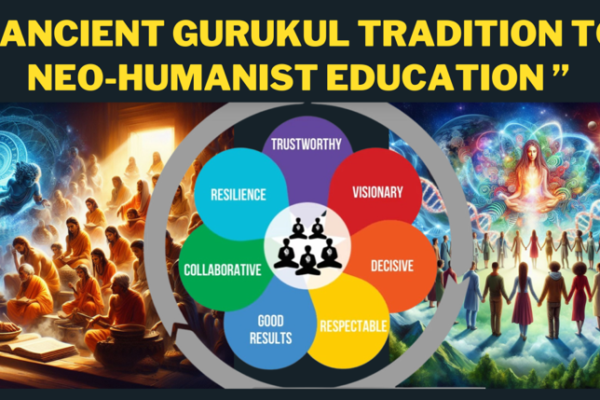– Shri Rajendra

Introduction
Education is the cornerstone of human progress. It is the means by which we transmit knowledge, wisdom, and values from one generation to the next. However, as our world becomes increasingly globalized and interconnected, the traditional boundaries of education are being redefined. In this era of rapid change and technological advancement, it is crucial that we evolve our educational paradigms to create a more holistic and compassionate society. Neo-humanistic education, which emphasizes the synthesis of morality, spirituality, and science, offers a promising path forward.
This article explores the concept of Neo-humanistic education, which suggests that a harmonious fusion of occidental extroversial science and oriental introversial philosophy is the very foundation upon which our educational systems should be built. In this vision, morality and spirituality are intertwined with the pursuit of knowledge, creating a new paradigm that seeks to nurture not only informed individuals but also compassionate and ethically grounded global citizens.
The Roots of Neo-Humanistic Education
Neo-humanism is a philosophy developed by Srii Prabhat Ranjan Sarkar, an Indian philosopher, social activist, and spiritual leader that seeks to transcend the boundaries of narrow-mindedness and exclusivity. It is a worldview that recognizes the inherent interconnectedness of all living beings and the importance of nurturing the physical, mental, and spiritual aspects of human existence. Neo-humanism calls for a synthesis of the Occidental (Western) and Oriental (Eastern) approaches to knowledge and life.
In Neo-humanistic education, the Occidental approach represents extroversial science, which is rooted in empirical observation, objectivity, and the quest for external knowledge. On the other hand, the Oriental approach embodies introversial philosophy, which focuses on introspection, inner exploration, and the pursuit of spiritual wisdom.
” To build a healthy human race we should have given them proper guidance in philosophy, in science, in all branches of human knowledge-which we did not do. We have utilized science more for destructive purpose than for benevolent aims; we have distorted the thought process of human beings; we have deliberately misguided the people instead of leading them along the proper path…… The only remedy is Neohumansim.” ( Shrii Prabhat Ranjan Sarkar )
Morality, Spirituality, and Humanity
The foundation of Neo-humanistic education is built upon the pillars of morality, spirituality, and humanity. Let’s delve into each of these aspects to understand their significance in shaping a comprehensive and balanced educational system.
Morality: Morality (Cardinal moral principles) is the compass that guides our actions and interactions with others. In Neo-humanistic education, moral values are not taught as a rigid set of rules, but rather as a dynamic and evolving understanding of what it means to be a compassionate and responsible human being.
Teaching morality within the framework of Neo-humanistic education involves helping students develop a strong moral compass and encouraging them to make ethical decisions. This is not limited to personal integrity but extends to a wider concern for the well-being of all living beings and the environment. The goal is to foster a sense of empathy, social responsibility, and an understanding of the interdependence of all life on Earth. This sort of mental harmony may also be termed as morality.
Spirituality: Spirituality is often misunderstood as being synonymous with religion, but it transcends religious affiliations. In the context of Neo-humanistic education, spirituality is about nurturing the inner dimensions of human existence, allowing students to explore questions of purpose, meaning, and the interconnectedness of all life.
Spirituality encourages individuals to look inward and develop a deeper understanding of themselves and their place in the universe. It can provide the tools for coping with the challenges of life, fostering resilience, and enhancing emotional intelligence. A spiritual education does not seek to impose a specific belief system but encourages students to explore and connect with their inner selves ,with the larger cosmos and Cosmic Consciousness.
“Spirituality provides humanity with that subtle and tremendous power with which no other power can be compared. Therefore, with spirituality as the base, a rational philosophy should be evolved to deal with the physical, psychological and socio-philosophical problems of the day.” _ Shrii P.R.Sarkar
Humanity: At the heart of Neo-humanistic education is the notion of recognizing the inherent dignity and worth of every human being. This includes promoting a sense of global citizenship that transcends borders, cultural expressions and races. Neo-humanistic education teaches that we are all part of a larger human family and that our well-being is intricately linked to the well-being of others.
This perspective encourages students to cultivate a sense of empathy and compassion for those who may be less fortunate. It instills in them a sense of responsibility to work for the betterment of society and to address pressing global challenges, such as poverty, inequality, and environmental degradation. In this way, Neo-humanistic education fosters a commitment to humanitarian principles and social justice.

“As people become more generous and broad-minded, they rise above the feelings of casteism, tribalism, provincialism and nationalism, which evoke narrowness, violence, hatred and meanness. Those who enter the field of social welfare with feelings of “mine” and “yours” actually create divisions in human society. Those who wish to foster the welfare of living beings as a whole have to embrace universalism as the only alternative. If we look upon everything as our own, the question of “mine” and “yours” will dissolve; in universalism there is no opportunity for violence, hatred or narrowness.” (Prabhat Ranjan Sarkar)
The Fusion of Occidental Science and Oriental Philosophy
The Neo-humanistic approach advocates for a harmonious blending of Occidental science and Oriental philosophy. This union offers a comprehensive and balanced educational system that takes the best from both worlds:
Occidental Extroversial Science: Occidental science, primarily rooted in Western traditions, emphasizes empirical observation, rational analysis, and the pursuit of external knowledge. It has given us remarkable technological advancements, medical breakthroughs, and a deep understanding of the natural world.
In the context of Neo-humanistic education, Occidental science provides students with a solid foundation in critical thinking, problem-solving, and the scientific method. It teaches them to explore the external world and understand the laws governing the physical universe. This knowledge is crucial for addressing practical challenges and improving the quality of life for all.
Oriental Introversial Philosophy: Oriental philosophy, largely rooted in Eastern traditions, emphasizes introspection, mindfulness, and the exploration of inner wisdom. It includes practices like yoga, meditation, and inner engineering that enable individuals to connect with their inner selves and tap into a deeper understanding of the human experience.
Introversial philosophy offers students a unique opportunity to explore the inner dimensions of consciousness and experience. This can lead to enhanced emotional intelligence, stress management, and a greater sense of self-awareness. Such knowledge is valuable in fostering personal growth, resilience, and a sense of inner peace.
The Synergy of Morality, Spirituality, and Science
The fusion of Occidental extroversial science and Oriental introversial philosophy, within the framework of Neo-humanistic education, creates a synergy that is greater than the sum of its parts. This synergistic approach has several key advantages:
Holistic Development:
Neo-humanistic education ensures that students receive a holistic education that nurtures their physical, mental, and spiritual well-being. This holistic approach encourages the development of well-rounded individuals who are not only academically competent but also emotionally intelligent and ethically grounded.
Ethical Decision-Making:
The incorporation of morality and spirituality into education equips students with the tools to make ethical decisions. They learn to consider the impact of their actions on others and the environment, fostering a sense of social responsibility.
Inner Resilience:
Introversial philosophy promotes inner resilience, which is particularly valuable in an increasingly stressful and fast-paced world. Students are better equipped to handle challenges, setbacks, and emotional stressors, leading to improved mental health and well-being.
Compassion and Empathy:
A Neo-humanistic education system instills in students a sense of empathy and compassion for all living beings. This creates a more inclusive and caring society, where individuals are willing to work together for the greater good.
Global Citizenship:
Neo-humanistic education encourages students to become responsible global citizens. They understand the interconnectedness of the world and recognize the importance of addressing global issues such as climate change, poverty, and inequality.
The Challenges of Implementing Neo-Humanistic Education
While Neo-humanistic education offers a promising approach to nurturing well-rounded individuals and fostering a more compassionate and sustainable society, it also presents challenges.
“ Yet in the course of fighting for a Neohumanistic society, one will have to use all one`s rational faculties and all the resources of information at one`s command. One will have to take a courageous and also a very hard-headed approach in identifying and combatting forces of selfishness and vested interest.”
Implementing such a system requires a significant shift in educational paradigms, and there are several hurdles to overcome:
Resistance to Change:
Traditional education systems are deeply ingrained in many societies, making it challenging to introduce a more holistic and values-based approach. Resistance to change from educators, parents, and policymakers can be a significant obstacle.
Balancing Rigor and Values:
Finding the right balance between academic rigor and the integration of moral and spiritual values can be a delicate task. Educators need to ensure that students receive a solid foundation in traditional subjects without compromising the focus on ethics(cardinal human values) and spirituality.
Teacher Training and Development:
To successfully implement Neo-humanistic education, teachers must be adequately trained in both extroversial science and introversial philosophy. This requires ongoing professional development to equip educators with the necessary skills to impart a holistic education to their students.
Curriculum Design:
Designing a curriculum that seamlessly integrates morality, spirituality, and science is a complex process. It necessitates a reevaluation of existing curricula and the creation of new materials that embrace the Neo-humanistic philosophy.
Evaluation Metrics:
Traditional education often relies heavily on standardized testing to measure student performance. Neo-humanistic education requires the development of alternative assessment methods that can gauge a student’s holistic development, including their moral and spiritual growth.
Benefits of Neo-Humanistic Education

Despite the challenges, the benefits of adopting a Neo-humanistic educational approach are substantial and far-reaching. Here are some of the advantages:
Well-Rounded Individuals:
Neo-humanistic education fosters well-rounded individuals who possess a deep understanding of themselves, their place in the world, and a commitment to ethical principles (Cardinal Human values). This holistic approach to education equips students with a broader skill set that includes emotional intelligence, critical thinking, and problem-solving abilities.
A Compassionate Society:
The promotion of morality and spirituality in education leads to a more compassionate society. By understanding and appreciating the interconnectedness of all life, individuals are more likely to act with empathy and care for others including plants and animals, resulting in a more harmonious world.
Global Citizens:
Neo-humanistic education nurtures a sense of global citizenship. It encourages students to think beyond national borders (Geo-seniments) and to consider the well-being of the entire planet. This mindset is essential for addressing global challenges such as climate change, poverty, and inequality.
Personal Resilience:
Introversial philosophy and mindfulness practices promote personal resilience and well-being. Students who learn to manage stress, cultivate inner peace, and tap into their inner strength are better equipped to navigate life’s challenges.
Ethical Leadership:
Neo-humanistic education is a breeding ground for ethical leaders who can make decisions that prioritize the greater good. These leaders have a strong moral compass and an understanding of the complex ethical dilemmas that they may face in various fields, including business, politics, and science.
“You must have a flaming moral purpose so that greed, oppression and exploitation shrivel before the fire in you.” P.R.SARKAR
Sustainable Future:
The emphasis on spirituality and interconnectedness in Neo-humanistic education aligns with the goals of sustainability. Students educated in this manner are more likely to prioritize environmental conservation, responsible consumption, and ethical business practices.
Real-World Examples of Neo-Humanistic Education
While the concept of Neo-humanistic education is still evolving, there are examples from around the world that reflect its principles to varying degrees. These examples demonstrate the feasibility and success of incorporating elements of Neo-humanistic education into mainstream educational systems:
Bhutan’s Gross National Happiness:
Bhutan’s educational system is underpinned by the concept of Gross National Happiness (GNH), which includes not only economic indicators but also measures of well-being, cultural preservation, environmental sustainability, and good governance. The Bhutanese government has integrated mindfulness and meditation into the curriculum, emphasizing the importance of holistic well-being.
Waldorf Education:
Waldorf education, inspired by the philosophies of Rudolf Steiner, takes a holistic approach to education by addressing the physical, emotional, and intellectual aspects of a child’s development. It encourages experiential learning, artistic expression, and a strong focus on moral and ethical values.
Mindful Schools Program:
The Mindful Schools program in the United States is dedicated to introducing mindfulness and emotional intelligence into mainstream education. It provides teachers with training to incorporate mindfulness practices into their classrooms, helping students manage stress, improve focus, and cultivate emotional awareness.
Conclusion
Neo-humanistic education represents a vision for a more compassionate, harmonious, and sustainable future. By blending morality, spirituality, and science, this educational paradigm seeks to create well-rounded individuals who are not only academically competent but also ethically grounded and spiritually aware.
While challenges exist in implementing Neo-humanistic education on a widespread scale, real-world examples demonstrate its feasibility and the benefits it can bring to students and society as a whole. The integration of both Occidental extroversial science and Oriental introversial philosophy offers a comprehensive approach that addresses the physical, metaphysical, and spiritual dimensions of human existence.
As our world continues to evolve and face complex challenges, Neo-humanistic education provides a path toward a more interconnected and compassionate society. It reminds us that education is not just about acquiring knowledge but also about nurturing our shared humanity, instilling ethical principles, and embracing the inner wisdom that can guide us toward a brighter and more sustainable future.





